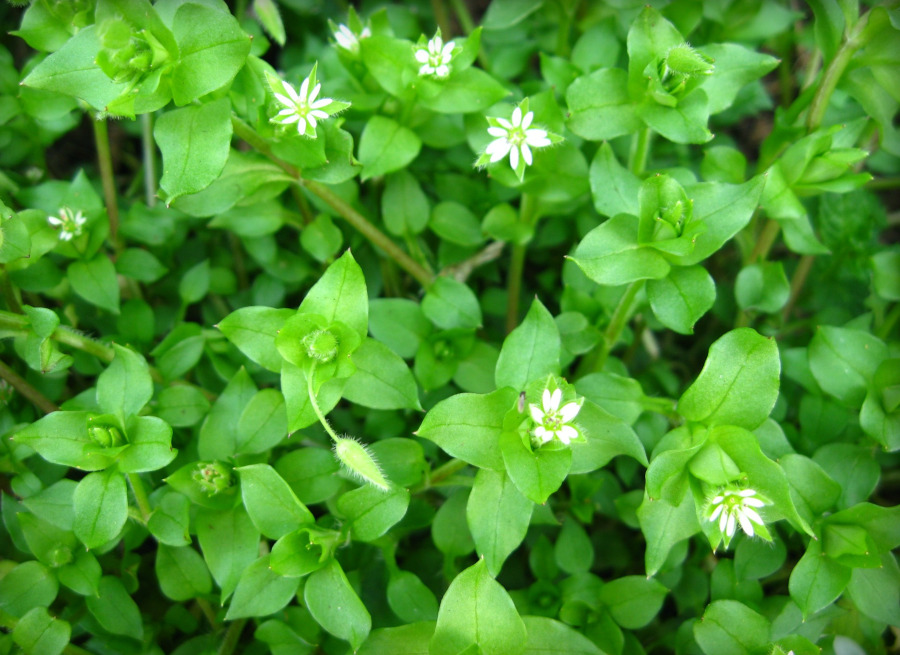Making chickweed tea is a simple process, and you can enjoy its potential benefits by following this basic recipe. Here’s how to prepare chickweed tea:
Ingredients:
- Fresh chickweed leaves and stems
- Water
Instructions:
- Harvest Chickweed: Be sure to gather fresh chickweed plants from a clean and pesticide-free area. Make sure you can positively identify chickweed to avoid any toxic lookalike plants. The best time to harvest chickweed is in the spring or early summer.
- Clean and Rinse: Rinse the chickweed thoroughly to remove any dirt or debris. You can use a colander or strainer to make this process easier.
- Boil Water: In a pot or kettle, bring water to a boil. The amount of water you need will depend on how strong you want your tea. As a general guideline, you can start with one cup of water for every teaspoon of chickweed, and adjust to your taste.
- Prepare Chickweed: While the water is heating, chop or crush the chickweed leaves and stems. You can use a knife or your hands to break them into smaller pieces. This helps release the flavor and beneficial compounds.
- Infuse Chickweed: Place the chopped chickweed into a teapot or heatproof container. When the water reaches a rolling boil, pour it over the chickweed.
- Steep: Cover the container and let the chickweed steep in the hot water for about 10-15 minutes. This steeping time allows the flavor and potential health benefits to infuse into the water.
- Strain: After steeping, strain the tea to remove the chickweed leaves and stems. You can use a fine mesh strainer, a tea infuser, or a coffee filter for this purpose.
- Serve: Pour the freshly brewed chickweed tea into a cup or teapot. You can enjoy it hot or let it cool and serve it over ice for a refreshing iced tea. You may also sweeten it with agave or add a squeeze of key lime for flavor.
Keep in mind that the taste of chickweed tea is mild and slightly earthy, so you may find it pleasant on its own. Experiment with the chickweed-to-water ratio and steeping time to adjust the strength of the tea to your liking.
Purpose of this tea
The purpose of chickweed tea is primarily to harness the potential health benefits associated with chickweed (Stellaria media), an edible and medicinal herb. Some of the purposes and intended benefits of chickweed tea include:
- Nutrient Intake: Chickweed is a source of various minerals, such as calcium, potassium, and iron. Drinking chickweed tea can help supplement your nutrient intake.
- Digestive Aid: Chickweed tea may be used to soothe digestive discomfort, such as indigestion, bloating, and constipation, potentially aiding in digestive health.
- Anti-Inflammatory: Chickweed is believed to have mild anti-inflammatory properties and is used to help reduce inflammation in conditions like arthritis and skin issues such as eczema.
- Weight Management: Some people use chickweed tea as part of their weight management regimen. It’s has mild diuretic properties and may help with appetite control.
- Skin Health: Chickweed tea, when applied topically or used in poultices, is said to help with various skin issues, including irritations, rashes, and itching.
- Respiratory Health: Chickweed tea is believed to provide relief for respiratory conditions like coughs, bronchitis, and asthma due to its potential anti-inflammatory and soothing effects.
- Detoxification: Chickweed is believed to support the body’s natural detoxification processes by promoting the elimination of waste and toxins.
- Antioxidant Support: Chickweed contains antioxidants, which can help protect cells from oxidative stress and may contribute to overall health and longevity.
- Immune Support: Chickweed may help boost the immune system, potentially aiding in the prevention of colds and other illnesses.
- Antimicrobial: Chickweed may have mild antimicrobial properties, which could help fight off certain infections.
The specific purpose of drinking chickweed tea can vary from person to person, depending on their health goals and concerns. Chickweed tea is generally considered safe for most people when consumed in moderation, its potential benefits are based on traditional use.














